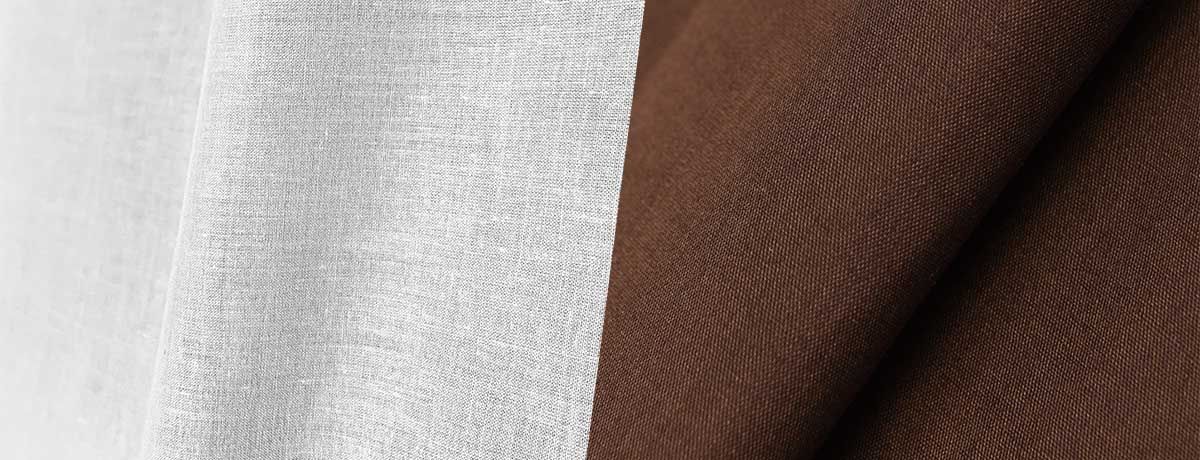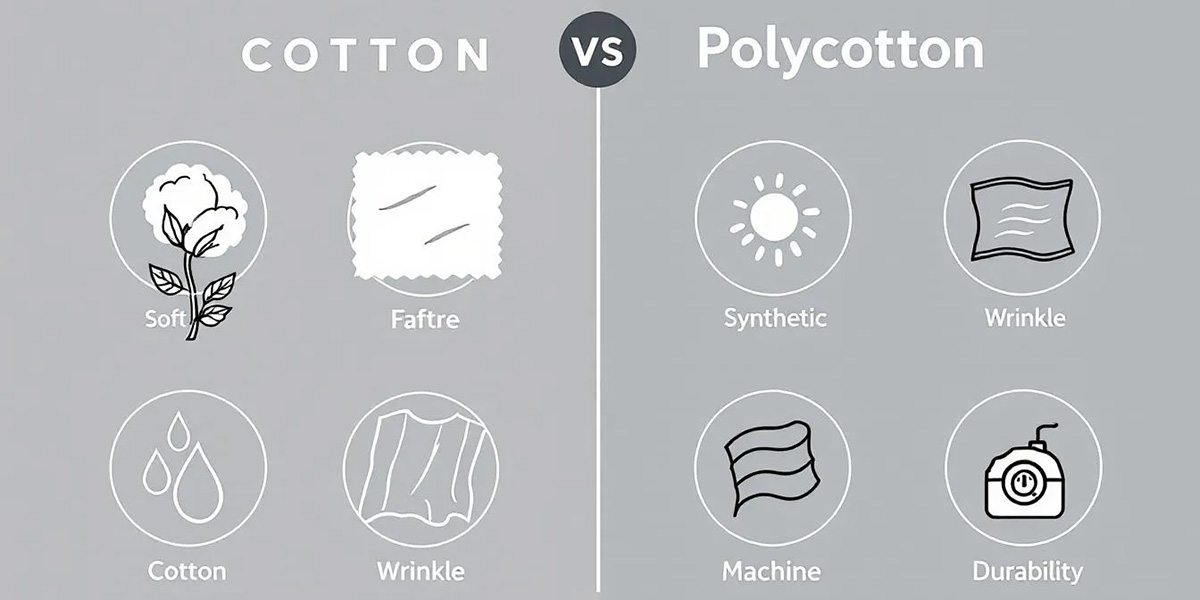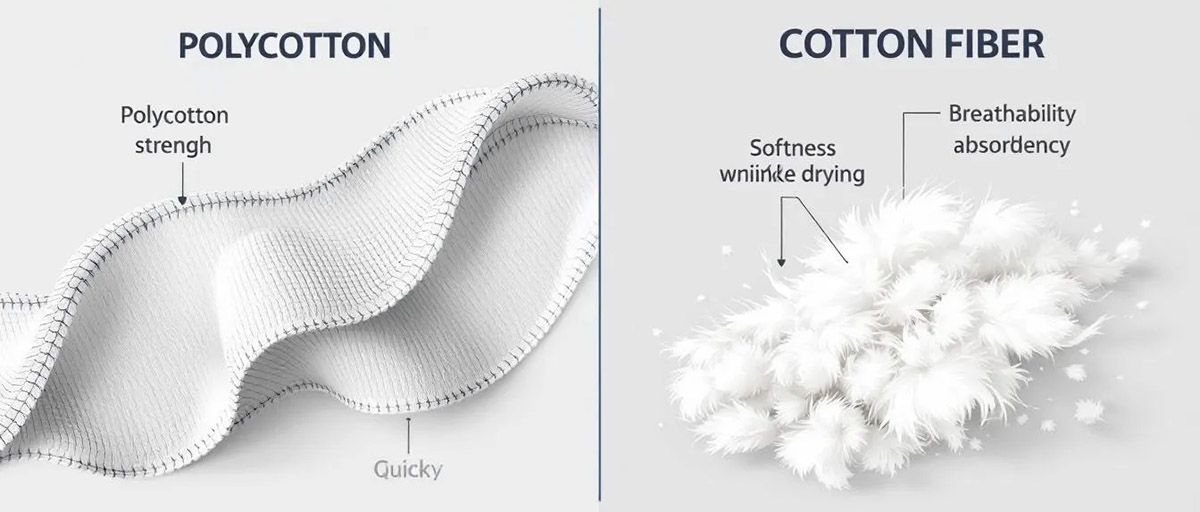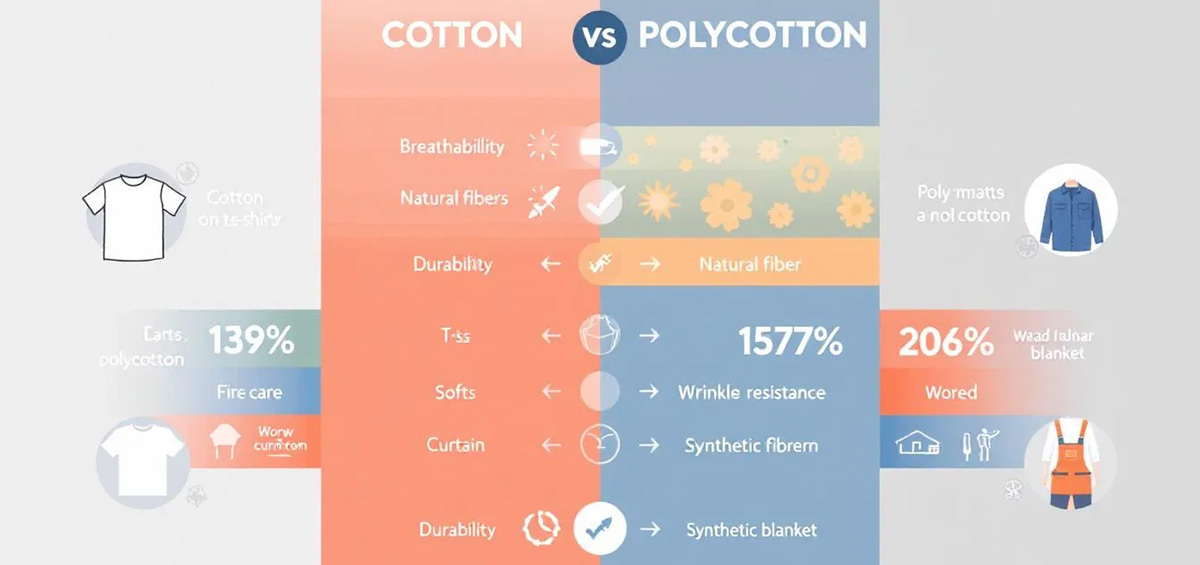Polycotton Versus Cotton: The Best Fabric Choice for You

Choosing between cotton vs polycotton can impact your comfort, wallet, and the environment. This article explores which is better for your needs by comparing their breathability, durability, care requirements, and cost.
Key Takeaways
-
Cotton is a natural fiber known for its softness, breathability, and comfort, while polycotton blends offer a combination of cotton’s comfort and polyester’s durability.
-
The properties of polycotton, such as softness, texture, and durability, can vary depending on the blend ratio of cotton and polyester.
-
Polycotton is generally more durable and easier to maintain than cotton, making it suitable for frequent washing and heavy use, despite being less breathable.
-
Choosing between cotton and polycotton involves considering factors such as personal comfort, intended use, environmental impact, and cost, with each fabric having unique benefits.
Understanding Cotton and Polycotton

Cotton is a natural fibre derived from the Gossypium plant, made from cotton fibres that surround the seeds of the cotton plant. This natural fibre is renewable, biodegradable, and valued for its softness, breathability, and comfort, especially when crafted from cotton fabric and natural fibres.
Polycotton blend is an example of synthetic blends, combining natural fibres like cotton with synthetic fibers such as polyester. Manufacturers use varying ratios of cotton and polyester, such as:
-
Around 35% polyester and 65% cotton
-
Other varying ratios to achieve different fabric properties, with some blends containing up to 80% polyester fibres, including options made from poly cotton fabric.
While cotton fabrics are made solely from natural fibers, polycotton fabrics combine natural and synthetic materials. This combination results in a fabric that retains the comfort of cotton while gaining the strength and longevity of cotton and polyester fibers, making polycotton a versatile choice for various textile products. In contrast, pure polyester fabrics offer maximum durability, wrinkle resistance, and low maintenance, but lack the breathability and softness of natural fibre options like cotton.
Breathability and Comfort
Cotton stands out for its highly breathable nature, keeping users cool and comfortable, especially in warm weather. Cotton can absorb moisture, helping to wick away sweat and keep the wearer dry. This makes it an excellent option for soft cotton bedding and clothing items made from breathable fabric aimed at ultimate comfort, including moisture wicking cotton sheets and cotton bed sheets for a comfortable bed.
Cotton is often chosen for comfortable clothing due to its breathability and softness. Cotton is a preferred choice for those with allergies because:
-
It is less likely to irritate sensitive skin.
-
Its ability to regulate body temperature ensures comfort by keeping you cool in summer and warm in winter.
-
This temperature regulation is often unmatched by synthetic fabrics.
Although not as breathable as pure cotton, polycotton offers its own advantages:
-
Wrinkle-resistant and durable, making them practical for those who prioritize easy maintenance.
-
Provide adequate comfort despite lower breathability.
-
Polycotton and some synthetic blends can sometimes trap heat, making them less suitable for hot climates.
-
Often tear-resistant, enhancing their longevity.
Durability and Longevity

Polycotton blends often outperform pure cotton in durability. The polyester fibers add strength and resilience, helping these fabrics retain their shape over time. This durability makes polycotton garments suitable for frequent washing without significant wear and tear. Additionally, polycotton fabrics provide excellent versatility for various applications.
While softer and more comfortable, cotton is generally more susceptible to fading and softening with each wash. Both cotton and polycotton can handle high-temperature washing, though cotton may need more gentle care to maintain its quality.
Polycotton’s resistance to shrinking and enhanced durability make it practical for items that need to endure heavy use. Its ability to withstand high temperatures without significant damage further adds to its appeal.
Maintenance and Care
Proper care extends the life of your fabrics. Cotton typically requires cold water washing to minimize shrinkage and requires ironing on low heat to avoid damage. While offering ultimate comfort, cotton can be more demanding to maintain.
In contrast, polycotton is easier to care for. Its advantages include:
-
Can be washed in warm water without shrinking
-
More resistant to wrinkles, often requiring less ironing
-
Dries quickly due to its synthetic fibers, making it convenient for busy households.
However, high heat drying can risk melting the polyester fibers in polycotton. Despite this, its ease of maintenance makes polycotton popular for those who prioritize durability and low-maintenance care.
Cost and Affordability
Cost is a significant factor when choosing between cotton and polycotton. Pure cotton is generally more expensive due to higher resource and labor investments, often making it a premium market choice.
On the other hand, polycotton fabrics offer more economical options, making them suitable for large-scale production and everyday use. This cost-effectiveness benefits budget-conscious consumers and industries needing large quantities of durable fabric.
Additionally, polycotton blends are less affected by market fluctuations in cotton prices, offering more consistent budgeting options. This affordability, combined with practical benefits, makes polycotton popular for many applications.
Use Cases and Applications
Different fabrics excel in various applications. Polycotton is often used in uniforms because of its durability and ease of maintenance. Its affordability and wide range of designs also make it popular for tablecloths and curtains.
In the hospitality industry, polycotton bedding is popular because it can withstand rigorous industrial laundry cycles, making it practical for bedding and linens. Its wrinkle resistance and quick drying are sought after for both home textiles and commercial use.
Cotton is recommended for everyday wear because of its comfort and breathability. Cotton clothing is especially valued for its softness and breathability, but it may require special care to maintain its quality and longevity. However, polycotton blends are favored for casual wear, including shirts, blouses, and lightweight dresses, due to their versatility and easy maintenance. Polycotton is also suggested for sportswear or workwear because of its durability and practical benefits.
Bedding Options
When it comes to creating the perfect sleep environment, your choice of bedding fabric plays a crucial role in comfort, durability, and ease of care. The most popular options are pure cotton, poly cotton, and blends of cotton and polyester fibers, each offering unique characteristics to suit different preferences and lifestyles.
Pure cotton bedding, made from 100% cotton fibers, is highly sought after for its naturally soft feel and breathable qualities. Cotton bed sheets and cotton bedding are excellent for those who prioritize ultimate comfort and a cool, fresh sleeping experience. Thanks to its natural fiber composition, cotton fabric is gentle on sensitive skin, helps regulate body temperature, and efficiently wicks away moisture—making it a top choice for anyone who values a breathable fabric that keeps you comfortable throughout the night.
On the other hand, poly cotton bedding—crafted from a blend of cotton and polyester fibers—offers a practical choice for busy households. Polycotton fabrics provide enhanced durability, wrinkle resistance, and the ability to withstand frequent washing without losing their shape or softness. Polycotton bed sheets are less prone to shrinking and can handle high temperatures, making them ideal for those who need bedding that stands up to daily use and high heat drying. The addition of polyester fibers means polycotton fabrics are more wrinkle resistant and require less ironing, saving you time and effort.
When choosing between cotton and poly cotton bedding, consider your personal preference and priorities. If you prioritize comfort, breathability, and a naturally soft touch, pure cotton bedding is likely your best bet. For those who value durability, easy maintenance, and wrinkle resistance, polycotton fabrics offer a balanced solution. Thread count, fabric composition, and care instructions are all important factors to review before making your decision.
Proper care is essential to extend the lifespan of your bedding. Cotton bedding should be washed in cold water and dried on low heat to maintain its softness and prevent shrinkage. In contrast, poly cotton fabrics can be washed in warm water and dried on high heat, making them a convenient option for frequent washing and busy routines.
Both cotton and polycotton fabrics have their own unique benefits. Cotton fibers deliver a naturally soft, highly breathable fabric, while polyester fibers add strength and wrinkle resistance. By blending these two materials, polycotton bedding offers a combination of comfort, durability, and practicality that suits a wide range of needs.
Ultimately, the best bedding option depends on what you value most—be it the luxurious feel of pure cotton, the easy-care nature of polycotton, or a blend that balances both. By considering the unique characteristics of each fabric and following proper care instructions, you can enjoy bedding that delivers comfort, durability, and a restful night’s sleep.
Environmental Impact
The environmental impact of fabric production is an important consideration. Conventional cotton production is resource-intensive, using significant amounts of water, land, and pesticides, contributing to environmental degradation. Cotton production is also linked to high greenhouse gas emissions, estimated at around 220 million tonnes annually.
While polycotton fabrics require less water and energy to produce, their synthetic fibers and synthetic material are non-biodegradable, posing long-term environmental challenges. Genetically modified cotton can reduce pesticide usage but may also negatively impact biodiversity.
Thus, the choice between cotton and polycotton depends on weighing these environmental factors.
Choosing the Right Fabric for You

Choosing the right fabric depends on personal preference and specific needs. Cotton, a biodegradable, renewable, and compostable natural fiber, offers breathability and comfort but requires high water and energy use for production. Polycotton, blending cotton and polyester, requires less water and energy but is not biodegradable.
Consider the fabric’s intended use when making a decision. For sensitive skin or a preference for natural fibers, cotton may be the better choice; just the fabric can also influence your selection. On the other hand, polycotton offers durability and ease of care, making it suitable for items that need to endure heavy use.
Whether you choose pure cotton or polycotton, understanding the characteristics of each will help you make a practical choice and informed decision aligned with your comfort, environmental values, and specific needs.
Summary
In summary, both cotton and polycotton have their unique advantages and disadvantages. Cotton offers exceptional breathability and comfort, making it ideal for those who prioritize natural fibers and ultimate comfort. However, it requires more maintenance and comes at a higher cost. Polycotton, with its blend of cotton and polyester, provides durability, affordability, and ease of care, making it a practical choice for various applications.
As you consider your fabric choices, weigh the factors of comfort, maintenance, cost, and environmental impact. By understanding these aspects, you can make an informed decision that best suits your lifestyle and values. Choose wisely, and enjoy the benefits of the right fabric for you.
Contact MH
MH offer polycotton and cotton fabrics. Please contact us for more details or inquiries. We're here to help!


